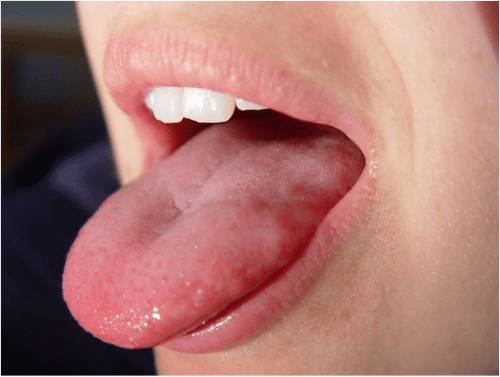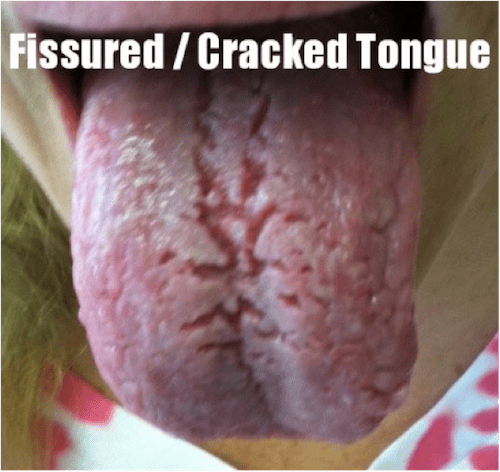This is an adaptation of one of my most popular blog posts titled Look At Your Tongue. In that article I talked through some of the most important things that you can learn about your health by looking at your tongue. In honor of Hypothyroid Mom's 2 year anniversary I wanted to put together a special article about what you can learn specifically about your Thyroid Health by examining your tongue as well as some useful tips to help you overcome these potential roadblocks. Now, you may be asking yourself, "how much can you really learn by looking at your tongue?" The truth is you can learn a lot by looking at the tongue and to me, it's one of the most useful physical exam focuses. The reason why it is so important, is because it is a glimpse into the inner workings of our digestive tract. It is the only part of our body that is directly connected to the stomach, unless you count the other end, but that's not as easy to examine. 
Not only is it directly connected to our digestive system but the tongue is often the "canary in the coalmine". That is, many deficiencies and imbalances will show up in the tongue before those problems manifest in other parts of the body and sometimes even before symptoms are present.
So, before I tell you what you can learn by looking at your tongue. I want you to participate, so take a selfie and share what your tongue looks like with all of your friends…….just kidding, that could be a little embarrassing, not to mention a little weird.
But in all seriousness, I really do want you to look at your tongue, so go grab a mirror and take a good, close look at your tongue. Then I want you to ask yourself these questions.
- What is the color of my tongue, is it pink? If not what color is it?
- Is my tongue smooth?
- Does my tongue look similar throughout?
- Does my tongue look like it is too big for my mouth, does it have indentations on the sides?
- Are there any cracks, fissures, or crevices?
- Is there a coating on the tongue?
All of these different features give us clues as to what may be going on with your thyroid and may have given you more information than your last set of labs.
So, hopefully this is what you see in the mirror. A healthy tongue should look pink, smooth, similar though out, without any cracks/fissures and without a coating on it like the picture below. If your tongue is healthy, then most often your thyroid will also be healthy.
Most people that come into my office do not have healthy tongues. Actually quite the contrary, very few people with hypothyroidism have healthy tongues. And if your tongue is unhealthy, then it is much more likely for your thyroid to be unhealthy. Here are examples of what unhealthy tongues look like and what it might mean for your thyroid health.
If the tongue is red or beefy that generally suggests a vitamin deficiency, especially the B-vitamins and folic acid. Not only are the B vitamins especially B12 important for proper thyroid utilization but having low levels of these micronutrients also suggests a problem with absorption. If you are not able to absorb micronutrients from your food and supplements then your thyroid will have a tough time doing its job.
Most people with tongues like this are not only deficient in B12 but also low in zinc, selenium, and iron, which are all important for thyroid conversion. If you notice this you should probably have those micronutrient levels checked and supplemented while starting to fix your absorption. Fixing your absorption starts by healing the gut.
If the tongue is fissured, cracked, or something called geographic (different all over, looks like a map) then that generally indicates that there are some underlying food sensitivities. These food sensitivities often develop after many years of damage to the gut. You see, when the gut is damaged it becomes "leaky". This "leaky gut" sets you up for the development of food sensitivities. When I see a tongue like this, almost without fail food sensitivities will be part of the problem.
This is particularly important when it comes to people with Hashimoto's because there is some evidence to suggest that the development of food sensitivities can be a trigger to the development of Hashimoto's. If you tongue looks like this you need to be sure to have your thyroid antibody levels checked (Anti-Thyroglobulin and Anti-Thyroid Peroxidase Antibodies) because a fissued/cracked tongue has been a good indicator. I would also recommend doing an IgG food allergy panel or, if you do not have access to that test, then simply try an elimination diet off of the two biggest offenders: wheat (gluten) and dairy (casein). Most people will notice a significant improvement just by cutting out those two foods.

If the tongue is too large and has indentations on the sides, this generally indicates that your body is full of toxins. The tongue can be a harbinger of toxins and when there are high levels of toxins in the body the tongue will start to swell and enlarge and will push against the sides of the teeth. This results in the tongue having indentations on the sides or something we call "scalloping". Toxins can hamper the thyroid in a couple of different ways: 1) they can have a blocking effect on the cell receptors so the thyroid hormone has a tough time doing its job inside of the cells, 2) there is also some evidence that these toxins can actually damage the thyroid gland. This damage makes the thyroid less effective and more prone to disease and underactivity.
Whenever, I see a tongue that is scalloped, I first think about enhancing detoxification. One of the easiest things that almost everyone can do to enhance detoxification is to drink more water. This seems to be a neglected aspect of health and detoxification. Most people are looking for the special "Detox Diet or Pill" but optimizing detoxification often starts with making sure that the body is optimally hydrated. I generally recommend my patients work up to at least 80 ounces of water every day.

If there is a coating on the tongue that suggests that there is a yeast overgrowth. Yeast (Candida) is an opportunistic infection and when the healthy gut bacteria has been disrupted then yeast can overtake residence in the digestive system. This is not limited to just the intestines and can also present on the tongue. Yeast can disrupt the thyroid in a couple of different ways but one of the most important ways that yeast effects thyroid hormone, is that it decreases the conversion of T4 to T3. Many people are walking around with suboptimal T3 levels because of a yeast overgrowth.
If you notice this then you should probably do a test to see if a yeast overgrowth is present. There are blood and stool tests that can identify this. We look for elevated levels of antibodies to yeast in the blood as one of our diagnostic tests. If this is identified, treatment for yeast is indicated. This includes a yeast-killing diet (low carbs, no yeast) as well as certain supplements including a high potency probiotic. Sometimes a compounded medication formulated specifically to treat yeast is needed but this is often reserved for more advanced cases.
Hopefully, studying your tongue was enlightening and will help you identify possible underlying issues with your thyroid health. Trying to overcome hypothyroidism is an arduous process and something that will have its ups and downs. It can be frustrating and overwhelming at times but I do believe that most people can optimize their thyroid functioning and start to feel better. Of course it always helps to have an Integrative Thyroid doctor to help you along the way.









0 comments:
Post a Comment